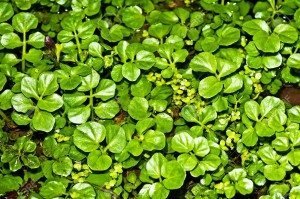Health cress benefits
Watercress is one of the vegetables with the highest total amount of phenols and the ability to neutralize free radicals. It has a high antioxidant content that could reduce the risk of chronic diseases.
Watercress is full of plant compounds called antioxidants that protect against cell damage caused by free radicals, which are harmful molecules that lead to oxidative stress.
Oxidative stress has been associated with several chronic diseases such as diabetes, cancer and cardiovascular diseases.
Fortunately, antioxidant-rich diets such as watercress can help protect against oxidative stress, which can reduce your risk of suffering from these diseases.
It is also high in phytochemicals, it can reduce your risk of developing certain types of cancer.
Watercress and other cruciferous vegetables contain glucosinolates, which are activated in compounds called isothiocyanates when cut with a knife or chewed.
Isothiocyanates include chemicals such as sulforaphane and phenyl phenylthiocyanate (PEITC).
These compounds protect against cancer by protecting healthy cells from damage, inactivating carcinogenic chemicals and blocking the growth and spread of tumors.
Beneficial for heart health.
Eating watercress can be beneficial for heart health in several different ways.
Watercress is part of the cruciferous vegetable family. A diet rich in cruciferous vegetables can benefit heart health.
Watercress contains the antioxidants beta carotene, zeaxanthin and lutein. Low levels of these carotenoids are associated with heart disease and high blood pressure.
In turn, the contents of minerals and vitamin K protect against osteoporosis.
Watercress contains many minerals necessary for bone health, including calcium, magnesium, potassium and phosphorus.
Although calcium is known for its effects on bone health, magnesium, vitamin K and potassium also play an important role.
A balanced diet with a high nutrient dense vegetable content correlates with a positive effect on bone health.
Vitamin K is a component of osteocalcin, a protein that forms healthy bone tissue and helps regulate bone turnover.
Likewise, nutrient density could help with weight loss.
Although it has not been studied specifically, watercress can also have weight control benefits.
It is an extremely nutrient dense food - a cup (34 grams) contains only four calories but provides several important nutrients as we saw earlier.
If you are trying to lose weight, it is worth adding this nutritious and low-calorie vegetable to your diet.

It should be noted that it is rich in carotenoids and vitamin C, which can protect eye health.
Watercress contains lutein and zeaxanthin, which are antioxidant compounds of the carotenoid family.
Numerous studies have shown that lutein and zeaxanthin are essential for eye health.
In particular, they protect the eyes from damage caused by blue light. Lutein and zeaxanthin have also been linked to a lower risk of developing age-related macular degeneration and cataracts.
In addition, vitamin C in watercress is also associated with a lower risk of developing cataracts.

